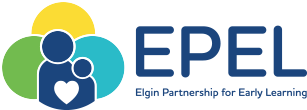History of EPEL
In 2011, community leaders convened an Early Childhood Task Force at a coffee shop to establish an early childhood community collaboration of public and private partnerships to design a model for an early childhood system that addressed not just early education, but all facets of young children’s health and development. The task force recognized the collaboration and all early childhood partners — including families, early educators, health providers, state agencies, social service organizations, philanthropies, faith-based, businesses, and others — to play a role in thriving children and families.
In 2012, the Elgin Partnership for Early Learning (EPEL) was formed as an early childhood community collaboration to ensure the healthy growth and optimal development of young children in the context of their families through local systems development. Community partners are committed to take action by giving up individual agendas and adopting an approach called Collective Impact, which leverages its partners’ commitment and contributions to improve local early childhood resources and sustainable outcomes. The collaborative work brings together early childhood care and education providers, community-based organizations, education, government, health care, social services, and a broad array of community stakeholders.
In 2021, EPEL rebranded and adopted a new logo to symbolize the mission and vision of children and families in the center of the work with overlapping circles that signify the cross-sector systems of support.
In 2022, Elgin Partnership for Early Learning filed for 501(c)(3) not-for-profit status.
A connected community plan provides a map for creating a coordinated, high-quality early childhood system that supports all of our community’s youngest children and their families, working towards narrowing the achievement gap as they enter Kindergarten.
